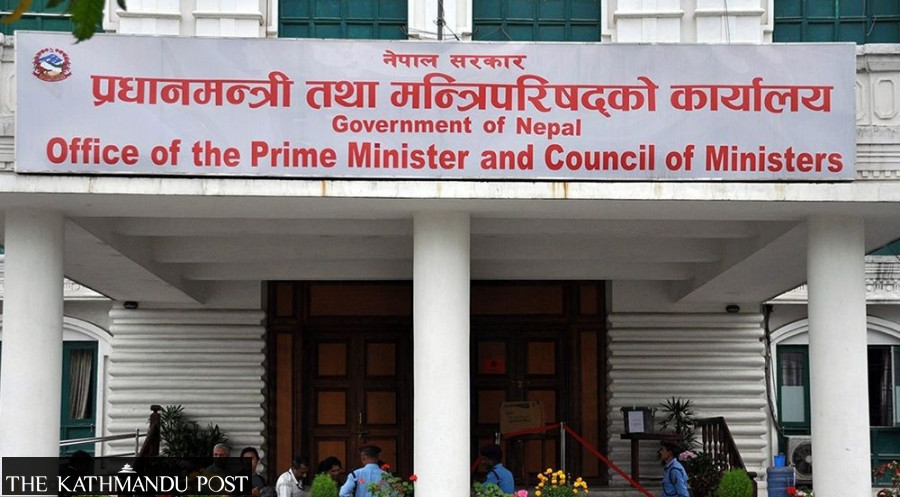National
Prime minister under pressure to move National Investigation Department back under Home Ministry
Cross-party lawmakers including those from the CPN-UML say the department can function better under the Home Ministry.
Binod Ghimire
Four years after the erstwhile prime minister KP Sharma Oli’s move of bringing the National Investigation Department (NID) under the Prime Minister’s Office (PMO), cross-party lawmakers have demanded that the department be brought under the purview of the Ministry of Home Affairs.
Soon after taking charge as prime minister, Oli in February 2018 brought three major departments including the NID which were under different ministries, under the purview of the PMO, in a move seen by many as the communist leader’s bid to centralise power.
The Department of Revenue Investigation (DRI) and the Department of Money Laundering Investigation (DMLI) were other two agencies which Oli had brought under the PMO.
In order to institutionalise his decision, the Oli government had in December 2019 registered a Special Service Bill at the parliament secretariat with a provision that the NID would be under the PMO. The upper house endorsed the bill retaining the provision and sent it to the House of Representatives.
Lawmakers in the State Affairs and Good Governance Committee of the lower house, however, objected to the provision. The bill was sent to the House committee for detailed discussions.
Taking part in the deliberations, the cross-party lawmakers, including those from Oli’s party, the CPN-UML, argued that NID can function effectively only if it is under the purview of the Home Ministry.
Nepali Congress lawmaker Gagan Thapa said during the deliberations that his party has a consistent position that the NID must be under the Home Ministry.
“We had reservations and suspicions about the erstwhile government’s move to bring the NID under the PMO,” he said. “Only the Home Ministry has the capacity to operate the NID.”
UML lawmakers also said given the prime minister’s busy schedule, keeping an institution like the NID under the PMO may not work effectively as the prime minister may not find time to take briefings on a regular basis.
“We believe the NID can function effectively under the Home Ministry,” said Nawaraj Silwal, a UML leader who is also a former deputy inspector general of the Nepal Police, at the House committee meeting.
The main opposition has registered an amendment to the bill demanding that the NID be brought under the Home Ministry.
The lower house can revise the bill which needs to be endorsed by the upper house for it to come into effect.
The NID is the only intelligence agency in the country which gathers the information related to national security along with financial crime, terrorism and organised crime among others.
Though Oli’s move of bringing the three key agencies under the PMO had attracted questions, the current Sher Bahadur Deuba government, which was formed in July last year, did not bother to reverse the decision.
Experts on administrative affairs say the PMO is a coordinating agency and not
an implementing body, hence Oli’s decision to bring NID, DMLI and DRI was wrong.
Umesh Mainali, a former secretary and chairperson of the Public Service Commission, said that as the Home Ministry is solely responsible for security arrangements, the NID must be under its purview.
According to hin, the Ministry of Home Affairs needs to have first-hand information on security matters.
“Along with the NID, the DRI and the DMLI also must be taken out of the purview of the PMO,” Mainali told the Post. “The PMO should only focus on monitoring and policy auditing.”
As the main opposition, the Congress had in the past criticised the move of the erstwhile Oli government to bring the three important investigation agencies under the PMO.
And more than a year into office, Prime Minister Deuba, also the Congress president, is overseeing the three agencies.
Jhapat Rawal, a UML lawmaker, asked why the Congress, which accused the erstwhile government of taking an authoritative path by bringing the NDI under the PMO, has not brought it under the Home Ministry yet.
“What is stopping the government from making the changes?” he questioned, speaking at the parliamentary committee.
The committee is expected to finalise the bill after further discussions.
Former officials at the NID, however, say there is nothing wrong in keeping the security agency under the PMO.
Devi Ram Sharma, a former chief of the NID, said the executive head must be the first consumer of the information.
“In principle, the prime minister must be the first person to get information from the intelligence. The intelligence department is under the executive head in most countries,” he told the Post. “When there are two agencies for intelligence, one can be under the Home Ministry.”




 8.79°C Kathmandu
8.79°C Kathmandu















